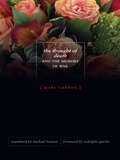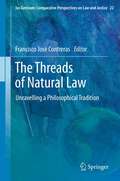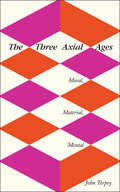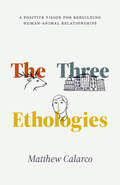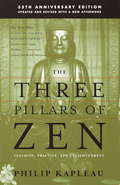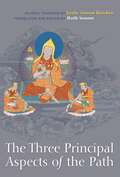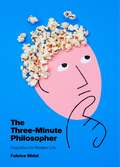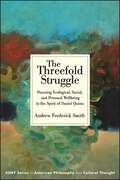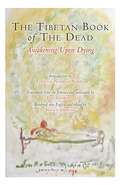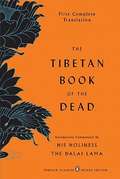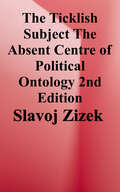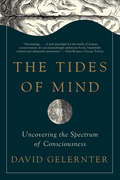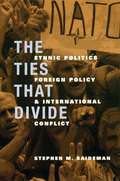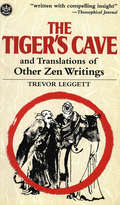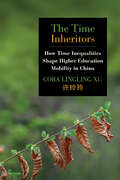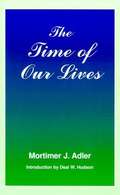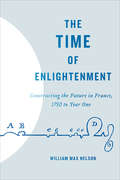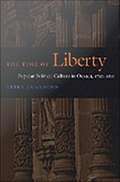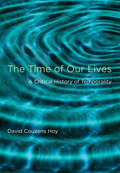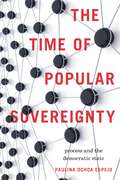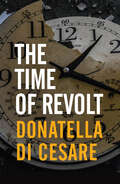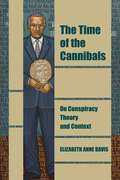- Table View
- List View
The Thought of Death and the Memory of War
by Marc CréponWar lays bare death and our relation to it. And in the wars—or more precisely the memories of war—of the twentieth century, images of the deaths of countless faceless or nameless others eclipse the singularity of each victim&’s death as well as the end of the world as such that each death signifies. Marc Crépon&’s The Thought of Death and the Memory of War is a call to resist such images in which death is no longer actual death since it happens to anonymous others, and to seek instead a world in which mourning the other whose mortality we always already share points us toward a cosmopolitics. Crépon pursues this path toward a cosmopolitics of mourning through readings of works by Freud, Heidegger, Sartre, Patocka, Levinas, Derrida, and Ricœur, and others. The movement among these writers, Crépon shows, marks a way through—and against—twentieth-century interpretation to argue that no war, genocide, or neglect of people is possible without suspending how one relates to the death of another human being.A history of a critical strain in contemporary thought, this book is, as Rodolphe Gasché says in the Foreword, &“a profound meditation on what constitutes evil and a rigorous and illuminating reflection on death, community, and world.&” The translation of this work received financial support from the French Ministry of Foreign Affairs.
The Threads of Natural Law
by Francisco José ContrerasThe notion of "natural law" has repeatedly furnished human beings with a shared grammar in times of moral and cultural crisis. Stoic natural law, for example, emerged precisely when the Ancient World lost the Greek polis, which had been the point of reference for Plato's and Aristotle's political philosophy. In key moments such as this, natural law has enabled moral and legal dialogue between peoples and traditions holding apparently clashing world-views. This volume revisits some of these key moments in intellectual and social history, partly with an eye to extracting valuable lessons for ideological conflicts in the present and perhaps near future. The contributions to this volume discuss both historical and contemporary schools of natural law. Topics on historical schools of natural law include: how Aristotelian theory of rules paved the way for the birth of the idea of "natural law"; the idea's first mature account in Cicero's work; the tension between two rival meanings of "man's rational nature" in Aquinas' natural law theory; and the scope of Kant's allusions to "natural law". Topics on contemporary natural law schools include: John Finnis's and Germain Grisez's "new natural law theory"; natural law theories in a "broader" sense, such as Adolf Reinach's legal phenomenology; Ortega y Gasset's and Scheler's "ethical perspectivism"; the natural law response to Kelsen's conflation of democracy and moral relativism; natural law's role in 20th century international law doctrine; Ronald Dworkin's understanding of law as "a branch of political morality"; and Alasdair Macintyre's "virtue"-based approach to natural law.
The Three Axial Ages: Moral, Material, Mental
by John TorpeyHow should we think about the “shape” of human history since the birth of cities, and where are we headed? Sociologist and historian John Torpey proposes that the “Axial Age” of the first millennium BCE, when some of the world’s major religious and intellectual developments first emerged, was only one of three such decisive periods that can be used to directly affect present social problems, from economic inequality to ecological destruction. Torpey’s argument advances the idea that there are in fact three “Axial Ages,” instead of one original Axial Age and several subsequent, smaller developments. Each of the three ages contributed decisively to how humanity lives, and the difficulties it faces. The earliest, or original, Axial Age was a moral one; the second was material, and revolved around the creation and use of physical objects; and the third is chiefly mental, and focused on the technological. While there are profound risks and challenges, Torpey shows how a worldview that combines the strengths of all three ages has the potential to usher in a period of exceptional human freedom and possibility.
The Three Ethologies: A Positive Vision for Rebuilding Human-Animal Relationships (Animal Lives)
by Matthew CalarcoA transformative vision for human-animal relations on personal, social, and environmental levels. The Three Ethologies offers a fresh, affirmative vision for rebuilding human-animal relations. Venturing beyond the usual scholarly and activist emphasis on restricting harm, Matthew Calarco develops a new philosophy for understanding animal behavior—a practice known as ethology—through three distinct but interrelated lenses: mental ethology, which rebuilds individual subjectivity; social ethology, which rethinks our communal relations; and environmental ethology, which reconfigures our relationship to the land we co-inhabit with our animal kin. Drawing on developments in philosophy, (eco)feminist theory, critical geography, Indigenous studies, and the environmental humanities, Calarco casts an inspiring vision of how ethological living can help us to reimagine our ideas about goodness, truth, and beauty.
The Three Pillars of Zen
by Roshi P. KapleauIn this classic work of spiritual guidance, the founder of the Rochester Zen Center presents a comprehensive overview of Zen Buddhism. Exploring the three pillars of Zen—teaching, practice, and enlightenment—Roshi Philip Kapleau, the man who founded one of the oldest and most influential Zen centers in the United States, presents a personal account of his own experiences as a student and teacher, and in so doing gives readers invaluable advice on how to develop their own practices. Revised and updated, this 35th anniversary edition features new illustrations and photographs, as well as a new afterword by Sensei Bodhin Kjolhede, who succeeded Kapleau as spiritual director of the Rochester Zen Center. A moving, eye-opening work, The Three Pillars of Zen is the definitive introduction to the history and discipline of Zen.
The Three Principal Aspects of the Path: An Oral Teaching
by Geshe Sonam RinchenThe wish for freedom, the altruistic intention, and the wisdom realizing emptiness constitute the essence of the Buddhist path. In this teaching, Geshe Sonam Rinchen explains, in clear and readily accessible terms, Je Tsongkhapa’s (1357–1419) famed presentation of these three essential topics.
The Three Stigmata of Friedrich Nietzsche
by Nandita Biswas MellamphyFollowing Nietzsche's call for a philosopher-physician and his own use of the bodily language of health and illness as tools to diagnose the ailments of the body politic, this book offers a reconstruction of the concept of political physiology in Nietzsche's thought, bridging gaps between Anglo-American, German and French schools of interpretation.
The Three Sustainabilities: Energy, Economy, Time
by Allan StoeklBringing the word sustainability back from the brink of cliché—to a substantive, truly sustainable future Is sustainability a hopelessly vague word, with meager purpose aside from a feel-good appeal to the consumer? In The Three Sustainabilities, Allan Stoekl seeks to (re)valorize the word, for a simple reason: it is useful. Sustainability designates objects in time, their birth or genesis, their consistency, their survival, their demise. And it raises the question, as no other word does, of the role of humans in the survival of a world that is quickly disappearing—and perhaps in the genesis of another world. Stoekl considers a range of possibilities for the word, touching upon questions of object ontology, psychoanalysis, urban critique, technocracy, and religion. He argues that there are three varieties of sustainability, seen from philosophical, cultural, and economic perspectives. One involves the self-sustaining world &“without us&”; another, the world under our control, which can run the political spectrum from corporatism to Marxism to the Green New Deal; and a third that carries a social and communitarian charge, an energy of the &“universe&” affirmed through, among other things, meditation and gifting. Each of these carves out a different space in the relations between objects, humans, and their survival and degradation. Each is necessary, unavoidable, and intimately bound with, and infinitely distant from, the others.Along the way, Stoekl cites a wide range of authors, from philosophers to social thinkers, literary theorists to criminologists, anthropologists to novelists. This beautifully written, compelling, and nuanced book is a must for anyone interested in questions of ecology, energy, the environmental humanities, contemporary theories of the object, postmodern and posthuman aesthetics, or religion and the sacred in relation to community.
The Three-Minute Philosopher: Inspiration for Modern Life
by Fabrice MidalFrench philosophy and meditation expert Fabrice Midal's The Three-Minute Philosopher includes forty brief essays for tapping into a deeper understanding of your existence, with experiences that will transform, enlighten, and invite you to see the world in a new way. Philosophy takes us by surprise. It challenges us, awakens us, and opens our minds. It does not tell us to be "wise" or to be a perfect being, but instead to nurture our own humanity. Philosophical thinking is the antithesis of the rampant dogmatism that dominates so much public discussion, of the vehemently expressed opinions of those who think they know everything and who insist you agree with them. Self-proclaimed experts tell us to listen to and obey their injunctions, but philosophers encourage us to think for ourselves. After all, philosophy addresses what makes us human and helps us navigate everyday life, from dealing with that annoying colleague at work, to the panic of realizing that your fridge is empty when guests arrive out of the blue.Fabrice Midal teaches the power of trusting in our own thoughts and strengthening our connection to humanity, as he guides us through the inspirational ideas of forty writers, artists, thinkers, and seers from Baudelaire to Nietzsche, Emily Dickinson to Toni Morrison, Pablo Picasso to James Baldwin, and of course, Socrates to Aristotle. Simple, smart, and approachable, Midal's three-minute essays ask us to step back, reflect, and meditate, and encourage us to think about the world a little differently.
The Threefold Struggle: Pursuing Ecological, Social, and Personal Wellbeing in the Spirit of Daniel Quinn (SUNY series in American Philosophy and Cultural Thought)
by Andrew Frederick SmithWe members of settler colonial culture—the latest form of what novelist and cultural critic Daniel Quinn calls Taker culture—are constrained by myriad institutions that leave us with little choice but to engage in practices that are profoundly damaging to the planet, to others, and to ourselves. Our path to living otherwise, Andrew Frederick Smith argues, lies in the threefold struggle, which is inspired by Quinn's focus on the interweaving roots of ecological, social, and personal wellbeing. These three forms of wellbeing are co-implicated. We cannot enjoy one without equally enjoying the others; they are a package deal. As such, what works for people individually and collectively works for the planet, and vice versa. Reclaiming our lives and revitalizing our human and more-than-human communities are salient acts of resistance against Taker culture. They offer means of escape from our cultural captivity and an opportunity for full-spectrum wellbeing.
The Tibetan Book of the Dead: Awakening Upon Dying
by Padmasambhava Chogyal Namkhai Norbu Nancy Simmons Elio Guarisco Karma LingpaThe Tibetan Book of the Dead: Awakening Upon Dying, with introductory commentary by Dzogchen Buddhist master Chogyal Namkhai Norbu, is a new translation of the ancient text also known as The Great Liberation through Hearing in the Intermediate State. Both a practical guide and intriguing historical, cultural, and spiritual document, this new version incorporates recent discoveries that have allowed for a better translation of previously ambiguous passages. Revealing a set of instructions designed to facilitate the inner liberation of the dead or dying person, the book provides a guide to navigating the bardo--the interval between death and rebirth. Originally composed by Padmasambhava, an important Indian master of the eighth century, the Tibetan Book of the Dead was concealed in Tibet until it was discovered in the fourteenth century by Karma Lingpa, a famous Tibetan terton (discoverer of ancient texts). Describing in detail the characteristics and fantastic visions of each stage beyond death, the book includes invocations to be read aloud to the dying person, to help his or her successful journey toward the stage of liberation. Chogyal Namkhai Norbu's introduction clarifies the texts from the Dzogchen point of view and provides a scholarly summary of the ancient material based on his oral teachings and written works. In addition, material from several of Namkhai Norbu's more recent written works and oral teachers have been added, including an essay on the four intermediate states after death entitled Birth, Life, and Death. A full-color 16-page insert of traditional Tibetan art highlights Tibet's unique aesthetic wisdom. From the Trade Paperback edition.Death and in the Afterlife States; Appendix One: The Symbolism of the Peaceful and Wrathful Deities in the Tibetan Book of the Dead; Appendix Two: Some Editions of the Tibetan Book of the Dead; Bibliography; IndexFrom the Trade Paperback edition.
The Tibetan Book of the Dead: First Complete Translation (Penguin Classics Deluxe Edition) (Penguin Classics Deluxe Edition)
by Thupten Jinpa Padmasambhava Gyurme Dorje Graham ColemanOne of the greatest works created by any culture and overwhelmingly the most significant of all Tibetan Buddhist texts in the West, The Tibetan Book of the Dead has had a number of distinguished translations, but none encompassed the work in its entirety. Now, in one of the year's most important publishing events, the entire text has not only been made available in English but in a translation of quite remarkable clarity and beauty. With an introductory commentary by His Holiness The Dalai Lama, who calls this translation "an extraordinary accomplishment undertaken with great care over many years" this complete edition faithfully presents the insights and intentions of the original work. It includes one of the most detailed and compelling descriptions of the after-death state in world literature, exquisitely written practices that can transform our experience of daily life, guidance on helping those who are dying, and an inspirational perspective on coping with bereavement. Translated with the close support of leading contemporary masters, including HH Dilgo Khyentse Rinpoche, and learned scholars such as Khamtrul Rinpoche and Zenkar Rinpoche, His Holiness the Dalai Lama says, "I hope that the profound insights contained in this work will be a source of inspiration and support to many interested people around the world. " .
The Ticklish Subject: The Absent Centre of Political Ontology (The Essential Zizek Series)
by Slavoj ZizekSlavoj Zizek, the maverick philosopher, author of over 30 books, acclaimed as the "Elvis of cultural theory", and today's most controversial public intellectual. His work traverses the fields of philosophy, psychoanalysis, theology, history and political theory, taking in film, popular culture, literature and jokes--all to provide acute analyses of the complexities of contemporary ideology as well as a serious and sophisticated philosophy. His recent films The Pervert's Guide to the Cinema and Zizek! reveal a theorist at the peak of his powers and a skilled communicator. <p><p>Now Verso is making his classic titles, each of which stand as a core of his ever-expanding life's work, available as new editions. Each is beautifully re-packaged, including new introductions from Zizek himself. Simply put, they are the essential texts for understanding Zizek's thought and thus cornerstones of contemporary philosophy. <p><p>The Ticklish Subject: The Absent Centre of Political Ontology: A specter is haunting Western thought, the specter of the Cartesian subject. In this book Slavoj Zizek unearths a subversive core to this elusive specter, and finds within it the indispensable philosophical point of reference for any genuinely emancipatory project.
The Tides of Mind: Uncovering the Spectrum of Consciousness
by David GelernterA “rock star” (New York Times) of the computing world provides a radical new work on the meaning of human consciousness. The holy grail of psychologists and scientists for nearly a century has been to understand and replicate both human thought and the human mind. In fact, it's what attracted the now-legendary computer scientist and AI authority David Gelernter to the discipline in the first place. As a student and young researcher in the 1980s, Gelernter hoped to build a program with a dial marked "focus." At maximum "focus," the program would "think" rationally, formally, reasonably. As the dial was turned down and "focus" diminished, its "mind" would start to wander, and as you dialed even lower, this artificial mind would start to free-associate, eventually ignoring the user completely as it cruised off into the mental adventures we know as sleep. While the program was a only a partial success, it laid the foundation for The Tides of Mind, a groundbreaking new exploration of the human psyche that shows us how the very purpose of the mind changes throughout the day. Indeed, as Gelernter explains, when we are at our most alert, when reasoning and creating new memories is our main mental business, the mind is a computer-like machine that keeps emotion on a short leash and attention on our surroundings. As we gradually tire, however, and descend the "mental spectrum," reasoning comes unglued. Memory ranges more freely, the mind wanders, and daydreams grow more insistent. Self-awareness fades, reflection blinks out, and at last we are completely immersed in our own minds. With far-reaching implications, Gelernter’s landmark "Spectrum of Consciousness" finally helps decode some of the most mysterious wonders of the human mind, such as the numinous light of early childhood, why dreams are so often predictive, and why sadism and masochism underpin some of our greatest artistic achievements. It’s a theory that also challenges the very notion of the mind as a machine—and not through empirical studies or "hard science" but by listening to our great poets and novelists, who have proven themselves as humanity's most trusted guides to the subjective mind and inner self. In the great introspective tradition of Wilhelm Wundt and René Descartes, David Gelernter promises to not only revolutionize our understanding of what it means to be human but also to help answer many of our most fundamental questions about the origins of creativity, thought, and consciousness.
The Ties That Divide: Ethnic Politics, Foreign Policy, and International Conflict (International Relations)
by Stephen SaidemanEthnic conflicts have created crises within NATO and between NATO and Russia, produced massive flows of refugees, destabilized neighboring countries, and increased the risk of nuclear war between Pakistan and India. Interventions have cost the United States, the United Nations, and other actors billions of dollars.While scholars and policymakers have devoted considerable attention to this issue, the question of why states take sides in other countries' ethnic conflicts has largely been ignored. Most attention has been directed at debating the value of particular techniques to manage ethnic conflict, including partition, prevention, mediation, intervention, and the like. However, as the Kosovo dispute demonstrated, one of the biggest obstacles to resolving ethnic conflicts is getting the outside actors to cooperate. This book addresses this question.Saideman argues that domestic political competition compels countries to support the side of an ethnic conflict with which constituents share ethnicities. He applies this argument to the Congo Crisis, the Nigerian Civil War, and Yugoslavia's civil wars. He then applies quantitative analyses to ethnic conflicts in the 1990s. Finally, he discusses recent events in Kosovo and whether the findings of these case studies apply more broadly.
The Tiger's Cave
by Trevor LeggettWhat happens when a young Zen monk makes a terrible mistake at a public ceremony? What sort of reception does a well-known abbot get today when he visits his old teacher? The answers to these questions can be found in this fascinating translation of Japanese Zen texts by Trevor Leggett. From historical incidents to classes Zen commentaries, this is an account of actual Zen life-the life of traditional temple training-and a valuable guide to the meaning of Zen in Japan.
The Tiger's Cave
by Trevor LeggettWhat happens when a young Zen monk makes a terrible mistake at a public ceremony? What sort of reception does a well-known abbot get today when he visits his old teacher? The answers to these questions can be found in this fascinating translation of Japanese Zen texts by Trevor Leggett. From historical incidents to classes Zen commentaries, this is an account of actual Zen life-the life of traditional temple training-and a valuable guide to the meaning of Zen in Japan.
The Time Inheritors: How Time Inequalities Shape Higher Education Mobility in China (SUNY series, Education in Global Perspectives)
by Cora Lingling XuReveals the role of time in reproducing inequalities as students navigate rural-to-urban, cross-border, and transnational higher education.Can a student inherit time? What difference does time make to their educational journeys and outcomes? The Time Inheritors draws on nearly a decade of field research with more than one hundred youth in China to argue that intergenerational transfers of privilege or deprivation are manifested in and through time. Comparing experiences of rural-to-urban, cross-border, and transnational education, Cora Lingling Xu shows how inequalities in time inheritance help drive deeply unequal mobility. With its unique focus on time, nuanced comparative analysis, and sensitive ethnographic engagement, The Time Inheritors opens new avenues for understanding the social mechanisms shaping the future of China and the world.
The Time Of Our Lives: The Ethics Of Common Sense
by Mortimer J. Adler Deal HudsonIs it a good time to be alive? Is ours a good society to be alive in? Is it possible to have a good life in our time? And finally, does a good life consist of having a good time? Are happiness and "a good life" interchangeable? These are the questions that Mortimer Adler addresses himself to. The heart of the book lies in its conception of the good life for man, which provides the standard for measuring a century, a society, or a culture: for upon that turns the meaning of each man's primary moral right - his right to the pursuit of happiness. The moral philosophy that Dr. Adler expounds in terms of this conception he calls "the ethics of common sense," because it is as a defense and development of the common-sense answer to the question "can I really make a good life for myself?"
The Time of Enlightenment: Constructing the Future in France, 1750 to Year One
by William Max NelsonA new idea of the future emerged in eighteenth-century France. With the development of modern biological, economic, and social engineering, the future transformed from being predetermined and beyond significant human intervention into something that could be dramatically affected through actions in the present. The Time of Enlightenment argues that specific mechanisms for constructing the future first arose through the development of practices and instruments aimed at countering degeneration. In their attempts to regenerate a healthy natural state, Enlightenment philosophes created the means to exceed previously recognized limits and build a future that was not merely a recuperation of the past, but fundamentally different from it. A theoretically inflected work combining intellectual history and the history of science, this book will appeal to anyone interested in European history and the history of science, as well as the history of France, the Enlightenment, and the French Revolution.
The Time of Liberty: Popular Political Culture in Oaxaca, 1750-1850
by Peter GuardinoBetween 1750 and 1850 Spanish American politics underwent a dramatic cultural shift as monarchist colonies gave way to independent states based at least nominally on popular sovereignty and republican citizenship. In The Time of Liberty, Peter Guardino explores the participation of subalterns in this grand transformation. He focuses on Mexico, comparing local politics in two parts of Oaxaca: the mestizo, urban Oaxaca City and the rural villages of nearby Villa Alta, where the population was mostly indigenous. Guardino challenges traditional assumptions that poverty and isolation alienated rural peasants from the political process. He shows that peasants and other subalterns were conscious and complex actors in political and ideological struggles and that popular politics played an important role in national politics in the first half of the nineteenth century. Guardino makes extensive use of archival materials, including judicial transcripts and newspaper accounts, to illuminate the dramatic contrasts between the local politics of the city and of the countryside, describing in detail how both sets of citizens spoke and acted politically. He contends that although it was the elites who initiated the national change to republicanism, the transition took root only when engaged by subalterns. He convincingly argues that various aspects of the new political paradigms found adherents among even some of the most isolated segments of society and that any subsequent failure of electoral politics was due to an absence of pluralism rather than a lack of widespread political participation.
The Time of Our Lives: A Critical History of Temporality
by David Couzens HoyA study of the emergence in post-Kantian continental philosophy of a focus on the lived experience of temporality. The project of all philosophy may be to gain reconciliation with time, even if not every philosopher has dealt with time expressly. A confrontation with the passing of time and with human finitude runs through the history of philosophy as an ultimate concern. In this genealogy of the concept of temporality, David Hoy examines the emergence in a post-Kantian continental philosophy of a focus on the lived experience of the “time of our lives” rather than on the time of the universe. The purpose is to see how phenomenological and poststructuralist philosophers have tried to locate the source of temporality, how they have analyzed time's passing, and how they have depicted our relation to time once it has been—in a Proustian sense—regained. Hoy engages with competing theoretical tactics for reconciling us to our fleeting temporality, drawing on work by Kant, Heidegger, Hegel, Husserl, Merleau-Ponty, Nietzsche, Gadamer, Sartre, Bourdieu, Foucault, Bergson, Deleuze, Žižek, and Derrida. Hoy considers four existential strategies for coping with the apparent flow of temporality, including Proust's passive and Walter Benjamin's active reconciliation through memory, Žižek's critique of poststructuralist politics, Foucault's confrontation with the temporality of power, and Deleuze's account of Aion and Chronos. He concludes by exploring whether a dual temporalization could be what constitutes the singular “time of our lives.”
The Time of Popular Sovereignty: Process and the Democratic State
by Paulina Ochoa EspejoDemocracy is usually conceived as based on self-rule or rule by the people, and it is this which is taken to ground the legitimacy of the democratic form of government. But who constitutes the people? Democratic political theory has a potentially fatal weakness at its core unless it can answer this question satisfactorily. In The Time of Popular Sovereignty, Paulina Ochoa Espejo examines the problems the concept of the people raises for liberal democratic theory, constitutional theory, and critical theory. She argues that to solve these problems, the people cannot be conceived as simply a collection of individuals. Rather, the people should be seen as a series of events, an ongoing process unfolding in time. She then offers a new theory of democratic peoplehood, laying the foundations for a new theory of democratic legitimacy.
The Time of Revolt
by Donatella Di CesareAs capitalism triumphs on the ruins of utopias and faith in progress fades, revolts are breaking out everywhere. From London to Hong Kong and from Buenos Aires to Beirut, protests flare up, in some cases spreading like wildfire, in other cases petering out and reigniting elsewhere. Not even the pandemic has been able to stop them: as many were reflecting on the loss of public space, the fuse of a fresh explosion was lit in Minneapolis with the brutal murder of George Floyd. We are living in an age of revolt. But what is revolt? It would be a mistake to think of it as simply an explosion of anger, a spontaneous and irrational outburst, as it is often portrayed in the media. Exploding anger is not a bolt from the blue but a symptom of a social order in which the sovereignty of the state has imposed itself as the sole condition of order. Revolt challenges the sovereignty of the state, whether it is democratic or despotic, exposing the violence that underpins it. Revolt upsets the agenda of power, interrupts time, throws history into disarray. The time of revolt, discontinuous and intermittent, is also a revolt of time, an anarchic transition to a space of time that disengages itself from the architecture of politics. This brilliant reflection on the nature and significance of revolt will be of interest to students of politics and philosophy and to anyone concerned with the key questions of politics today.
The Time of the Cannibals: On Conspiracy Theory and Context (Thinking from Elsewhere)
by Elizabeth Anne DavisIn 2009, the body of a former president of the Republic of Cyprus, Tassos Papadopoulos, was stolen from his grave. The Time of the Cannibals reconsiders this history and the public discourse on it to reconsider how we think about conspiracy theory, and specifically, what it means to understand conspiracy theories “in context.” The months after Papadopoulos’s body was stolen saw intense public speculation in Cyprus, including widespread expressions of sacrilege, along with many false accusations against Cypriots and foreigners positioned as his political antagonists. Davis delves into the public discourse on conspiracy theory in Cyprus that flourished in the aftermath, tracing theories about the grave robbery to theories about the division of Cyprus some thirty-five years earlier, and both to longer histories of imperial and colonial violence. Along the way, Davis explores cross-contextual connections among Cyprus and other locales, in the form of conspiracy theories as well as political theologies regarding the dead bodies of political leaders. Through critical close readings of academic and journalistic approaches to conspiracy theory, Davis shows that conspiracy theory as an analytic object fails to sustain comparative analysis, and defies any general theory of conspiracy theory. What these approaches accomplish instead, she argues, is the perpetuation of ethnocentrism in the guise of contextualization. The Time of the Cannibals asks what better kind of contextualization this and any “case” call for, and proposes the concept of conspiracy attunement: a means of grasping the dialogic contexts in which conspiracy theories work recursively as matters of political and cultural significance in the long durée.
